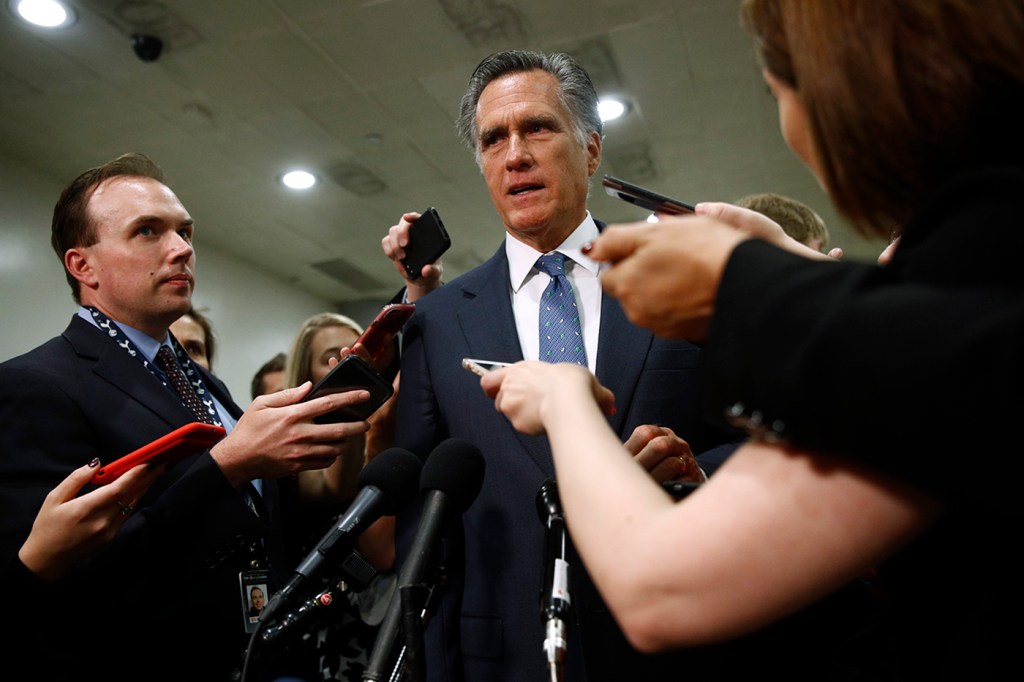Mitt Romney’s Pierre Delecto secret Twitter account has a surprisingly harmless explanation

This week Mitt Romney—a former Republican candidate for president and current U.S. senator—revealed that he has a secret “lurker” Twitter account. He hinted at the existence of the account during an interview with The Atlantic, and it took mere hours after the article’s publication for a reporter at Slate to track it down.
But just what was the high-profile politician doing in the shadows of social media anonymity, when he has several active, public accounts?

John Wihbey is an assistant professor of journalism and media innovation at Northeastern. Photo by Matthew Modoono/Northeastern University
Romney told The Atlantic that he uses it to “keep tabs on the political conversation.” He follows different users on his secret account than he does on his public account.
As it turns out, Romney’s strategy isn’t all that unusual.
The senator is likely seeking a different mix of news from each account—a strategy for information-gathering that’s fairly commonplace, says John Wihbey, an assistant professor of journalism and media innovation at Northeastern.
Every time we interact with Twitter—by posting, or retweeting or liking someone else’s post—we send information to Twitter’s algorithm about what we like and don’t like, says Wihbey, whose recent book examines the intersection of news and social media.
And while the exact inner workings of those automated decisions are kept under lock and key, the result is that Twitter’s algorithm serves us more of what it thinks we like from people we might be interested in, and less of what we don’t like, Wihbey says.
“Except that he’s a former presidential candidate and a senator, he’s just dealing with the same problem everyone has, which is that the [Twitter] algorithm isn’t showing the tweets he wants to see in his timeline,” says Wihbey.
Romney has tweeted only 10 times as “Pierre Delecto,” the name under which he created the secret account, using it more to take in information than put information out. (This is also what Romney means when he described it as “lurking.”)
If Romney was using his Pierre Delecto account to “lurk,” as he described it, he wasn’t interacting with Twitter as much, and was therefore sending less information to its algorithm, Wihbey says.
Romney also doesn’t follow President Donald J. Trump on his secret account, he told The Atlantic, because, he said, the president “tweets so much.”
If the president’s tweets were dominating Romney’s timeline, then creating a new, anonymous account might have been a way to counteract it, Wihbey says.
“From the standpoint of an information-seeking, or engagement strategy, that’s a really good one,” Wihbey says.
It’s not uncommon, he added, for regular civilians to have several Twitter accounts that are perhaps tailored to specific interests.
“If you’re an accountant, maybe you have a Twitter account where you just follow the 100 most influential voices in accounting, to stay on top of the news,” Wihbey says.
Wihbey notes that Twitter users also have the option to change the way their timeline appears so that it is less reliant upon the algorithm. A setting at the top of the page allows users to view their timelines chronologically.
Of course, it’s also possible that Romney just wanted to surf the ‘net without drawing a lot of attention to himself. He wouldn’t be the first well-known person to operate clandestinely in order to gauge the temperature of a given topic. James Comey, the former FBI director, has secret Twitter and Instagram accounts. So did Bryan Colangelo, the former president of an NBA basketball team.
“In essence, Romney is doing a little bit of that,” Wihbey says. “He wants to be a more normal person who can just do things without huge amounts of scrutiny.”
For media inquiries, please contact Shannon Nargi at s.nargi@northeastern.edu or 617-373-5718.





